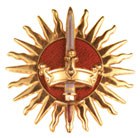Society's History
Origin of the Society of Knights Bachelor
The Society’s History
Origin of the Society of Knights Bachelor
The founding of the Society was due to a case which was fought with the Walker Trustees in Edinburgh who, as holders of the office (originally by purchase) of Usher of the White Rod under the Walker Trust Act of 1877, were entitled to receive certain dues from those persons receiving honours from the Crown. Many Knights objected to this.
In 1902 a change had been made in the procedure connected with promotions of honour. The Central Chancery of the Orders of Knighthood (instituted by King Edward VII in that year) was given control of procedure for the ceremonial admission and promotion of all members of the statutory orders. One exception to this concerned the Knights Bachelor.
The Walker case highlighted the fact that Knights Bachelor had no representative body to speak for them in the matter of the Walker Trustees and Sir William Bull MP called a meeting of Knights Bachelor in the House of Commons to discuss the problem. As a result of this, a formal meeting was convened at 31 Essex Street, in the Strand, on 27th April 1908 at which the Society of Knights Bachelor was founded.
The Office of Usher of the White Rod was an ancient one, existing before the Union of England and Scotland on the accession of James VI of Scotland to the throne of England in 1603. The earliest document referring to this office is in 1393.
The case for the payment of dues to the Walker Trustees on behalf of White Rod was heard in March 1909, when judgement was given by the Court in Session in the Outer House of Lords in favour of the Walker Trustees.
However, on 1st December 1911 the Lord Advocate and others appealed to the House of Lords and the judgement was reversed with expenses, so that the right of the Walker Trustees could not be enforced and therefore they were not entitled to claim fees from recipients of honours. The prime motive in the formation of the Society had thereby been achieved.
Had the Society not been founded, as the Central Chancery for the Orders of Knighthood was only empowered to act for the Statutory Orders, it was possible that dues payable by a Knight Bachelor on his creation might still have been levied.
It is interesting to note that for certain honours the sums to be paid on their creation to the Walker Trustees were as follows:
| For a Duke | £21 13s 4d |
| Marquis | £18 6s 8d |
| Earl | £15 |
| Viscount | £10 |
| Baron | £6 13s 4d |
| Baronet | £5 |
| Knight Bachelor | £3 6s 8d |
Constitution of the Society
On 21st June 1908 the constitution, regulations and byelaws of the Society were adopted. The objects were to uphold the status, maintain the Register and rights of precedence and generally to protect and advance the interests of Knights Bachelor. Official recognition of the Society was given in that year by the Home Secretary, when there were 770 Knights Bachelor, of whom 232 became members.
In 1912 HM King George V permitted by Royal Warrant the Society the great privilege of adding to its name the title ‘Imperial'.
Locations of the Society
Following the formation of the Society, subsequent meetings were held at Clements Inn, at Westminster and at Stone Buildings, Lincoln's Inn. In 1911, following numerous suggestions for a permanent home for the Society where members from across the Empire might meet, a Habitation Committee for this purpose was set up under Sir Henry Pellatt, Sir William Bull and Mr Willoughby Bullock, the Secretary and Clerk to the Council.
After protracted negotiations, a portion of Clifford's Inn was purchased and the first meeting was held there on 15th May 1912. The premises comprised a hall for entering, a library, smoking room, writing room, and porter's lodge.
The hall was large enough to entertain 80 persons, so presumably there were kitchens as well. The cost was £37,000, half being promised by the Knights Bachelor of Canada. Sir Henry Pellatt gave £7,000. The company administering the property was called ‘The Company of Knights', so that no financial responsibility would rest on the Society or its members. The outstanding amount was held in debentures. It was intended that, as further subscriptions from Knights Bachelor were received, the debentures would be redeemed. However, because of the Great War of 1914–18 insufficient contributions came in and no lettings were made of the Hall, so the Company went into liquidation. No trace of the original Clifford's Inn now remains, other than the entrance gateway off Fleet Street.
Meetings thereafter were held at various places, until in 1923 a room was allotted by Garter King of Arms at the College of Arms. It is not clear if this was intended as a temporary home for the Registry or just for the meeting held there on 15th November. Subsequently accommodation was taken at No.1 King's Bench Walk at a rent of £22p.a.
Various ideas were put forward for a permanent home, including the crypt of one of London's churches. This idea was overruled. Finally Sir William Bull reported on 3rd March 1927 at a meeting held at 21 Old Buildings, Lincoln's Inn, that he had taken a lease on those chambers in his own name at £65p.a. The Imperial Society remained there until 2005 when it moved to 1 Throgmorton Avenue, London. In 2013, the Society's office moved to Magnesia House, Playhouse Yard, Blackfriars.
The History of The Imperial Society of Knights Bachelor
By Peter Galloway
To be published by Spink & Co, 2021
A new and comprehensive history of The Imperial Society of Knights Bachelor, by The Revd Canon Professor Peter Galloway LVO OBE JP, Provost to The Society, will be published in 2021. Further details to follow on this website.
